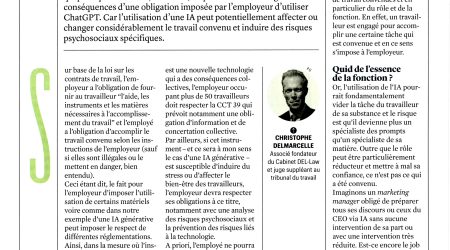When the state bends tax rules to support teleworkers
Posted the 13 April 2021In a circular dated February 26, 2021 (Circular 2021/C/20), which came into force on March 1, the tax authorities revisited telework-related cost allowances to provide clarification. It must be said that the previous circular (Circular 2020/C/100) had significant shortcomings. To top it off, this circular was approved by the NSSO, confirming that it would apply the same rules.
A notable change is that the tax administration now accepts that the flat-rate telework cost allowance of €129.48 per month (indexed amount) can be paid if the employee teleworks the equivalent of one day per week (excluding evenings and weekends).
The circular specifies the expenses covered by this allowance, such as the use of an office space, computer and printer equipment, office supplies (paper, folders, etc.), utilities like water, electricity, heating, maintenance, insurance, property tax, coffee, water, and snacks.
This clear definition allows—according to the tax administration—for additional telework-related expenses to be reimbursed either on an actual basis or at a flat rate.
For example, employers can reimburse the cost of office furniture, a second monitor, a printer, a lamp, a headset, a mouse, etc., provided these expenses are “reasonable” (as determined by the administration, which discourages luxury design lamps or extra-large gaming monitors) and the reimbursement is spread over the item's useful life (10 years for furniture, 3 years for computer equipment).
Employers can also reimburse internet costs (€20/month), the use of a private computer (€20/month), and the use of private peripherals (€5/month).
Moreover, the tax authorities allow employers to differentiate allowances based on objectively justified personnel categories and to pay the flat-rate allowance during vacation periods.
It is worth noting that using the flat-rate amounts allowed by the tax authorities and NSSO is not mandatory—higher amounts can be reimbursed if proof is provided of the professional nature and existence of the expenses. The tax authorities also acknowledge on their website that the statutory 10% flat rate for home workers can apply to teleworkers.
However, when employers are required to provide the necessary equipment for work, the reimbursement of telework costs must be agreed upon in the telework policy or agreement.
While this new circular was welcomed by many as a significant step forward, it introduces two elements that, in my view, represent a dangerous shift and circumvention of tax rules on expense allowances and benefits in kind.
First, the circular states that for three months—until June 2021—the €129.48 allowance will be increased to €144.31. Since there is no justification for telework costs being higher in April, May, and June than in previous or subsequent months, this increase in the allowance amount is essentially a way of using telework allowances to give employees a net financial boost. A sort of financial gift. In Belgium, it is well known that employers often use flat-rate allowances as a way to provide additional pay due to the excessive taxation of employment income. Representation allowances, for instance, are frequently a disguised form of remuneration. However, the fact that the government adopts this practice is not only surprising but also raises questions about the credibility of tax audits on such allowances.
Second, the circular allows employers to provide certain goods to teleworkers (e.g., desks, chairs, or furniture) free of charge without any taxable benefit in kind. Yet, the general rule is that any goods provided for personal use are subject to taxation as a benefit in kind—this includes phones, iPads, computers, and cars. Strangely, desks and chairs are excluded from this principle, despite their likely private use by teleworkers or their families.
I have been told these are minor exceptions...
However, the fundamental issue is that by making exceptions to the basic rules—even with good intentions to support workers—the government undermines its credibility and weakens the rule of law.
In late 2018, I highlighted in De Tijd/L’Echo how the government was gradually destroying the concept of remuneration—central to our tax system—through various exceptions. This was a response—without daring to implement major reform—to the heavy burden of income tax in Belgium. Now, the government, in its attempt to move forward, is dismantling the rules on expense allowances and benefits in kind.
This is simply regrettable and yet another example of what is happening to the rule of law in Belgium during the COVID crisis.
Related articles

Is an employer allowed to mandate the use of artificial intelligence tools by employees ? (Trends, 17-07-2025)

Caution if a former colleague opposed to your employer asks you to testify in their favor
